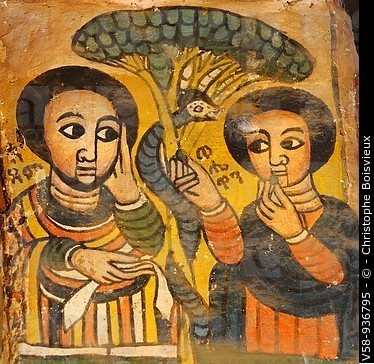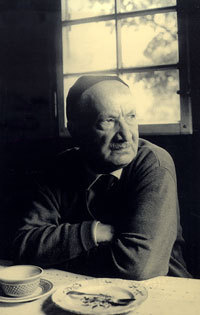R. Joseph Hoffmann's Blog: Khartoum, page 18
April 11, 2015
By Marx - Engels
"Inexorable" applied to love
means unescapable
but to sadness
unrelenting.
About sadness we know
a thing or two.
There is the sadness
each time I see you
and the sadness
when you walk away.
We hope for joy between,
inexorably we hope
to be released
but it will not come
because in between
there is us
and on either side, you
and what is left of me
that does not still
belong to you.
It is not much, now that you
have become everything,
but most of all
the sadness.
means unescapable
but to sadness
unrelenting.
About sadness we know
a thing or two.
There is the sadness
each time I see you
and the sadness
when you walk away.
We hope for joy between,
inexorably we hope
to be released
but it will not come
because in between
there is us
and on either side, you
and what is left of me
that does not still
belong to you.
It is not much, now that you
have become everything,
but most of all
the sadness.
Published on April 11, 2015 01:43
April 5, 2015
For You, John Donne

Give me the beauty that doth two embrace,
Not one all by herself to set the score,
The dark epistemology of heart and face
In Conflict bent for Conflict loved--not more.
Give me the aspiration of thine eye
Trained on such targets as both hearts despise,
Without perceiving what time spent might buy
Or what the cost to holiness implies.
Or give me nothing of yourself at all,
Not body, wit, or grace--not passion sweet
Nor tender words that mitigate the fall
I fell when first I saw in you my fate.
For this goodbye I think the angels weep
And devils satisfied do soundly sleep,
Published on April 05, 2015 10:36
March 25, 2015
A Word
Let there be silence
for God did not create noise.
No he created music and interval
and the quiet space between
us where every word is an offense
against purity and every worldly
beauty that is not you
is the lie.
And yes blindness to
the world, your gift to me
and this imperfect silence
I give you as it was
in the beginning, a small
and shining star.
for God did not create noise.
No he created music and interval
and the quiet space between
us where every word is an offense
against purity and every worldly
beauty that is not you
is the lie.
And yes blindness to
the world, your gift to me
and this imperfect silence
I give you as it was
in the beginning, a small
and shining star.
Published on March 25, 2015 10:23
February 21, 2015
The Muse Retiring
Methinks I must my muse destroy:
She giveth hardship never joy.
I seek the edge, the thought supernal--
She giveth only pastures vernal.
I say, 'Diana' (such I name her
And praise when I could ver'ly blame her)
'Give this swain thine inspiration.
Take away this constipation.'
'Scab', saith she, 'the shit you scrawl
Is not my doing, not at all,
But thine entirely--art so banal
'Tis praise indeed to call it anal.'
'Begone,' I say, 'Diana fair,
For foul thou very dost me here!
To call my art so gross as shit.'
'You can't fire me,' saith she, 'I quit'.
She giveth hardship never joy.
I seek the edge, the thought supernal--
She giveth only pastures vernal.
I say, 'Diana' (such I name her
And praise when I could ver'ly blame her)
'Give this swain thine inspiration.
Take away this constipation.'
'Scab', saith she, 'the shit you scrawl
Is not my doing, not at all,
But thine entirely--art so banal
'Tis praise indeed to call it anal.'
'Begone,' I say, 'Diana fair,
For foul thou very dost me here!
To call my art so gross as shit.'
'You can't fire me,' saith she, 'I quit'.
Published on February 21, 2015 04:42
January 29, 2015
The Story of Man

We all begin in what we end
since from the Garden we did wend
and traded pineapples for thorn
and turned God's care for us to scorn.
Sad, isn't it, this morbid turn
from Paradise, from man to worm.
From clay to clay, and dust to dust
we drearily pursue our Must.
God only said "You must not eat
this special fruit, so succulent,
that angels longed to keep it near.
But I said No, I'll plant it here.
I built this garden to conceal it
so that the serpent couldn't steal it.
I did this at extreme expense,
in spite of my omniscience.
I put you here as guard and guardess.
But frankly dears you've made a mess:
Now every one will want a nosh
I really wish I'd planted squash."
So spake poor God, so much betrayed--
The one who worlds and creatures made.
He flung them out the garden gate
and warned them, they should never mate
Or else there would be hell to pay.
And pay they did, along the way,
in pain and sorrow, care and worry
But that methinks's another story.
Published on January 29, 2015 21:17
January 22, 2015
Rabia
I remember the sweat
like cardamom sweet
and your eyes my god
that could not cry
and the lies you told
and could not tell
because you thought
he knows my lies
I said my sweet the sufi
call to visions
we cannot apprise.
And until then we dance
we twirl to rhythm
only God unfurls.
And in the end
when spinning ceases
We are the victims
of our seasons.
like cardamom sweet
and your eyes my god
that could not cry
and the lies you told
and could not tell
because you thought
he knows my lies
I said my sweet the sufi
call to visions
we cannot apprise.
And until then we dance
we twirl to rhythm
only God unfurls.
And in the end
when spinning ceases
We are the victims
of our seasons.
Published on January 22, 2015 04:41
January 12, 2015
Étude at Cafe Hawelka

I want a flat near enough
the Café Hawelka on the Dorotheergasse
to come every day
and find you there sipping
the darkest Viennese coffee and reading
--I don’t know--Pushkin's Tsar Saltan.
You will not look up when I enter,
and I will sit near the window.
You will wear a brown beret and the waiter
(who has already fallen in love with you)
will breathe a small sigh when he passes
your table. He will hold chairs
for the matrons in their absurd hats
but he will never take his eyes from you.
I will look out the window at the
ageing day and be happy for my Buchteln
And the white carafe that’s put in front of me.
I will not look at you: I will not say Fräulein
Have I mentioned that the way you sit
and the way you move your neck, has made
me certain that all the artists of Florence
were right about the mystery of women.
I hold the small cup to my face
to steal its warmth
and for a moment I close my eyes
to shut you in the warmth.
But you do not look up. Outside everything
is caught--people and shops--in a whit-grey mist
against a winter sky. But inside it is filled
with you. I imagine what it would be
to touch your shoulder in passing.
I know you have not turned a page
for half an hour. My cup is
down to the last drop and I must go.
I say Die Rechnung, bitte, and it is brought
but I have disturbed the waiter’s thought
of you and he somehow knows
that I am thinking only of you.
Not even a book or a newspaper to disguise me.
I will come again tomorrow, and you will wear red.

Published on January 12, 2015 01:47
January 6, 2015
The Fortunate Girl

do you know what you are
as when you sleep in a knot
or wake with your face struck
by a dream
or when your eyes
caress your face in a mirror
or the eyes of worshipers
envision you in your movements
like the promise of hot rain
lying straddled under a fan
or old women
who want to touch your hair
hissing their daughters
do not have such strong hair
do you know that you are
not what they see
not Helen nor yet Europa
some trophy for a boy or god
to rake and toss aside
no you are your voice
and the rhythm of your eyes thoughtful
and the terror in your face unloved
and the cry of your heart for another
and the beauty of a single flower
that will not come before I leave you
Published on January 06, 2015 02:07
December 28, 2014
Holy Atheism: The Puzzle of Heidegger’s “Letter on Humanism”

The origin of this little essay is a conversation I had a few nights ago when I was asked, quite unexpectedly, what books I might recommend to students seeking a deeper understanding of the world. Without much thinking, I pointed to Heidegger. Reflecting afterward, I realized that for most people Heidegger is merely “difficult” and that for many analytical philosophers (Ayer comes to mind) his writing is “rubbish.” In the right hands however, Heidegger can change minds and change lives.
Martin Heidegger is never an easy read, but he becomes more difficult with every new claim to offer a proprietary interpretation of his thought. In 1947 Heidegger published his Brief ueber den Humanismus (“Letter on Humanism”) in which he sorts through some of the tangles left behind in his 1927 opus, Being and Time and a treatise usually translated as What is Metaphysics? To come at this essay without some notion of Heidegger’s technical vocabulary, especially his complex views on metaphysics, is quickly to sink into linguistic mud. It’s equally difficult to sort through the later work without approaching it problematically. By that I mean that for all its emulsion, Heidegger was working through a very specific set of problems and a level of despair that has occasionally occupied philosophers to such an extent that paradox, aphorism and obscurity have seemed the only way to express the intractability of the problems themselves. Nietzsche comes immediately to mind, but there are tempting if imperfect analogies between Heidegger’s views and those of the negative theologians Gregory of Nyssa, Catherine of Sienna and Meister Eckhart.
The style he preferred in responding to his admirers—like Sartre–as well as his critics, such as Hannah Arendt—was never unconditionally generous, leaving the impression that Heidegger saw his particular mode of expression as appropriate to the subjects he tackled and most interpretation as being either reductionist, or erroneous.
He was not unaware of the power of double-speak as a tool in both political and philosophical discourse. In a 1966 Der Spiegel interview concerning his alleged Nazi sympathies (which finally cost him his teaching career and diminished his reputation in Germany), Heidegger said that in 1935 he had counted on the power of words to convey different meanings to two constituencies (his cleverest students and determined Nazi informants) when he praised the “inner truth and greatness of our movement.”
His sense of how words shape reality and can thus misshape perception and meaning is a constant prickle for anyone who wants to “interpret” Heidegger. It makes equally difficult the task of determining his influence on other thinkers, especially the French philosophers in whose eyes he found grace after 1967.
What makes the “Letter on Humanism” worth discussing is that he pulls no punches about his agenda: to locate in history the source of modernity’s ills. In the politically charged climate of postwar Europe, the easy answers focused on economic, religious, technological and social evils. The cure, it was often proposed, was to restore meaning to the term “humanism” as a category that rises above the particular expressions of modern culture.
In an important article, Gail Soffer notes that “What is peculiar to Heidegger and really questionable in his critique is his diagnosis of the cause of modernity’s ills: not capitalism and its greed; not Protestant religious beliefs; not even runaway technology or the Gestalt of the worker; but rather the humanism of the Western philosophical tradition. For Heidegger, “humanism lies at the root of the reification, technologization, and secularization characteristic of the modern world” (“Heidegger, Humanism and the Destruction of History,” Review of Metaphysics (49) 1996).
Heidegger was not, of course, unaware of the history of the term humanism in early Renaissance thought or even earlier glimmerings in Christian thinkers such as Abelard and Pico della Mirandola. But he was not especially interested in this history of discussion, or at least such discussion could only be useful in deconstruction (Destruktion).
In a strictly connative sense, humanism is that philosophy which either assigns a defined universal essence to man as “a rational animal,” characterized primarily by voluntary action, or it is the denial of essence—a position leading ultimately to Sartre’s conclusion that existentialism is a pure form of humanism. Man is what he is through choice and action. The political appeal of the latter position is that a non-essentialist view of humanism leaves open the possibility for human beings to create worthy social institutions, human rights, Bildung in the humanities and “true” sciences (as opposed to mere technological expertise), and also to reject unworthy ones—such as Nazism.
In none of his writings, however, does Heidegger suggest that “man has no essence.” His message in the “Letter” is that this essence has been misconstrued: that to say “Man is a rational animal” is to predetermine what the nature of man is at a metaphysical level, and that to do so shuts off discussion of the relationship between Being and being human.
To be a knowing subject in relation to known objects is, for Heidegger, to determine the essence of man “downward.” Out of a range of possible definitions, we have chosen the ones that equate science and reason with the sufficient definition—the essence—of humanity. In historical context, we have taken the historical determinants of humanism, which Heidegger sees as a set of familiar phenomena, as being the same as the underlying essence of these phenomena. Heidegger rejects the idea that humanism as we understand the term can provide an understanding of what it means to be thrown into a world of possibilities and others. It does not provide an “analytic” that can help us to understand authenticity, mortality, responsibility. Humanism can provide no escape from the “vulgarity of calculation” or a sense of the temporality of existence.
This leads to the question of God and the matter of Heidegger’s atheism. To an extent, we are playing with language in a way Heidegger would, approvingly, have found amusing. The a-theism he subscribes to is a rejection of God–literally being without the God of history and tradition–and a quest for a non-metaphysical God. It is this aspect of Heidegger’s thought and the subject of die Kehre or “turning” (biographical or procedural?) in his thinking about Dasein that frustrates interrogation—in spite of a small embarrassment of new sources published since his death.
In the world of poetry and technology, God remains the subliminal (literally, beneath the limit) problem. Theologians since Ebeling and Bultmann have exploited this aspect of Heidegger’s almost mystical argot on the topic, and Stuart Elden has analyzed the subject in a useful article (“To Say Nothing of God”, Heythrop Journal, 45/3, 2004, 344-48.). It has been frustrating to students of Heidegger that this “refusal of a theological voice” (Laurence Paul Hemming, 2002) tweaks the nose of theology rather than encourages theological speculation. But, as with humanism, any unconcealed definition of God would be trivialization, and it has been the role of historical theology to offer familiar formulas and definitions in place of concealment.
Thus Heidegger has theology precisely where he wants it: trying to figure him out. His challenge to humanism: that we cannot employ it to address questions of meaning, value and authenticity. His challenge to theology, that the discovery of God cannot be something as simple as forming objective images from subjective data, mainly historical. The possibility of a God without being must be considered. Aquinas considered it. But the axiom “There is no God” cannot be derived from the possibility.
Published on December 28, 2014 03:33
December 26, 2014
The Rābiʿah of Samarkand

And so I wait for something plush,
Something decisive beside the tomb
Of Timur’s wife. Before Taj Mahal
There was this mosque. Ninety five
Elephants, ten thousand precious stones
And the conquest of the world rest here.
Love Does this and quieter things:
It moves hearts to works of courage
And to deceit. I have yearned to see
The work of the heart in you,
Like this courage, like these lies,
Gratitude that cannot last
But leaves a glistening impression
On the mind and makes the heart
Burn with possibility. You are
Merely the gateway: I smell the spice-sellers
On you, hawking, and the worshipers unsure
Where to turn because of you, you are so much
I cannot see or know or say.
Here under the tiles Bibi Khanum lies dead and even
This magnificence could not save her reputation,
For the architect’s kiss was so hot
It left a burning scar upon her face, a wound
That even Tamburlaine in all his glory
Could not ignore or forgive.
Published on December 26, 2014 07:58
Khartoum
Khartoum is a site devoted to poetry, critical reviews, and the odd philosophical essay.
For more topical and critical material, please visit https://rjosephhoffmann.wordpress.com/
Khartoum is a site devoted to poetry, critical reviews, and the odd philosophical essay.
For more topical and critical material, please visit https://rjosephhoffmann.wordpress.com/
...more
For more topical and critical material, please visit https://rjosephhoffmann.wordpress.com/
Khartoum is a site devoted to poetry, critical reviews, and the odd philosophical essay.
For more topical and critical material, please visit https://rjosephhoffmann.wordpress.com/
...more
- R. Joseph Hoffmann's profile
- 48 followers



